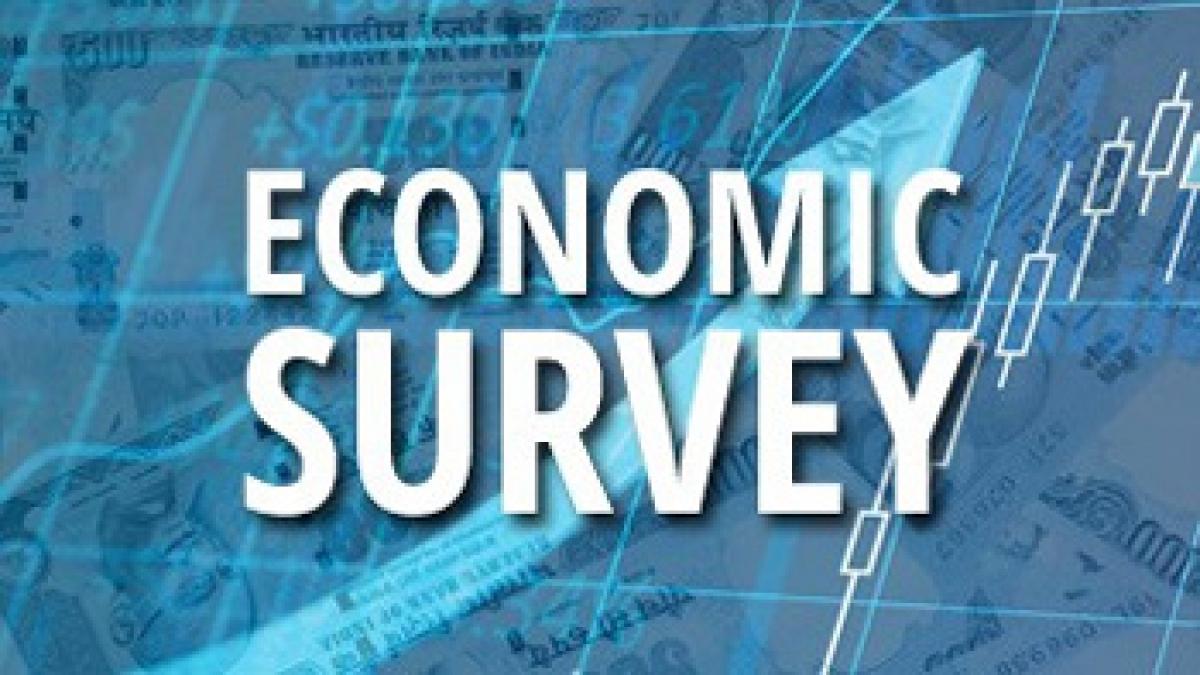Live
- Free Study Materials Distributed to Needy MBBS Freshers by Seniors
- Boeing lays off over 400 members of professional aerospace union
- An egg a day may boost memory, brain functions in women: Study
- Ready for debate on BRS 10 year rule and Congress one year's, TPCC Chief Mahesh Goud
- Director Arjun Jandhyala speaks about ‘Devaki Nandana Vasudeva’
- Amitabh Bachchan praises Bihar’s ‘LittiChokha’
- ‘Maha Sandram’ gets a grand launch
- Cong wants to break marginalised communities, BJP bats for everyone: PM Modi
- Sara Ali Khan enjoys camping under full moon
- Centre launches campaign for assessment year 2024-25 to help taxpayers
Just In

India\'s Economic Survey sees the growth rate for the coming fiscal to remain at 7-7.75 percent due to domestic factors and warns that the upcoming budget will have to contend with an unusually challenging and weak external environment.
New Delhi: India's Economic Survey sees the growth rate for the coming fiscal to remain at 7-7.75 percent due to domestic factors and warns that the upcoming budget will have to contend with an unusually challenging and weak external environment.
The survey, tabled in parliament by Finance Minister Arun Jaitley here on Friday, also expresses concern over pan-India GST being elusive, the divestment programme falling short of target and recast of the distortive subsidy regime, especially for fertilisers, being a work-in-progress.
This apart, the survey says, balance sheets of Indian banks remain stressed, becoming a roadblock to the revival of private investments, adding to the anxiety that the country's growth potential of 8-10 percent in the long term.
"This year's survey comes against the backdrop of an unusually volatile external environment with significant risks of weaker global activity and non-trivial risks of extreme events," says the survey, authored by Chief Economic Advisor Arvind Subramanian.
"Fortifying the Indian economy against possible spill-over is consequently one obvious necessity. Another necessity is recalibration of expectations," it says, and warns that if the world lurches into a crisis or slides further into weakness, India's growth, too, will be severely affected.
On the positive side, though, the survey says India will remain the fastest-growing large economy and a refuge of stability with an outpost of opportunity, even as steps taken toward a stable tax tax system, ease of doing business and foreign participation have gone down well globally.
It also projects the retail inflation to ease further to 4.5-5 percent in 2016-17. Coming as it does on the eve of the national budget for the next fiscal, and given its import in providing the direction the country's economic policy should take in the coming year, the survey also spells out its policy prescriptions, both broad and specific.
Among them, it wants as good an exit policy for industry, notably start-ups, as entry norms as it will remove impediments to investments, job creation and growth. It also wants focus ro return towards agriculture and human needs like health and education to reap the demographic dividend.
"While dynamic sectors such as services such as services and manufacturing tend to grab public attention, India cannot afford to neglect its agriculture. After all, nearly 42 percent of Indian households derive bulk of their income from farming."
On fiscal deficit, it says the target of 3.9 percent of GDP, which Jaitley set for this fiscal, was achievable. But it also says the coming year will be a challenging one, calling for improving tax compliance, tapping new revenue sources, re-look expenditure and recast subsidies.
It wants the income tax net to widen from 5.5 percent of earning individuals to 20 percent. Notwithstanding the volatality and turmoil, the survey says the Indian equity markets have been relatively resiliant compared to peers in other major emerging market economies, and potentially sees the country as the leading investment destination due to its robust economic fundamentals.
The survey also feels there is lot to be done so that policy-making is quick with public servants being able to decide without fear or favour. As of now, it says, the legal provisions are seen as draconian, and anti-corruption laws scaring the honest without deterring the corrupt.
"There is a widely held perception both within the civil service and among outsiders who interact with government, that civil servants have in recent times become increasingly reluctant to decide issues quickly and firmly. This has consequences for the economy."
On social aspects, the survey makes some worrisome observations and calls for corrective action. It says India still has the second highest number of undernourished people, warranting immediate action. Over 42 percent of its pregnant women are underweight.
"Despite recent progress, India generally under-performs on maternal and child-health indicators, it says, adding: "India is already half-way through its demographic dividend and taking the full advantage requires a healthy and educated population."
Subramanian also outlines what has been the theme and focus of this year's survey, given that the Indian economy is "richly complicated". He says the focus is to outline policies that will enable Indians to lead a better, richer and healthier life. On the whole, he remains an optimist. "In sum, for now, but not indefinitely, the sweet spot for India is still beckoningly there."

© 2024 Hyderabad Media House Limited/The Hans India. All rights reserved. Powered by hocalwire.com







